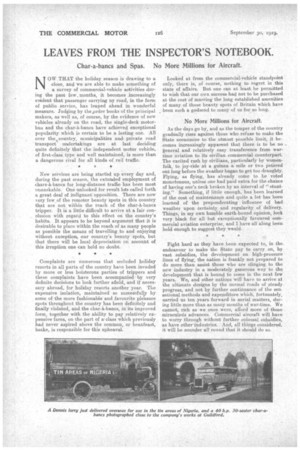LEAVES FROM THE INSPECTOR'S NOTEBOOK.
Page 8

If you've noticed an error in this article please click here to report it so we can fix it.
Char-a-bancs and Spas. No More Millions for Aircraft.
NOW THAT the holiday season is drawing to a close, and we are able to make something of a survey of commercial-vehicle activities during the past few, months, it becomes increasingly evident that passenger carrying by road, in the form of public . service, has leaped ahead in wonderful measure. Judging by the prder books of the principal makers, as well as, of course, by the evidence of new vehicles already on the road, the single-deck motorbus and the char-a-ba.ncs have adhieved exceptional popularity which is certain to be a lasting one. All over the‘country, municipalities and private road transport • undertakings are at last deciding quite definitely that the independent motor vehicle, of first-class type and well maintained, is more than a dangerous rival for all kinds of rail traffic.
New services are being started up every day and, during the past season, the extended employment of chars-aabancs for long-distance traffic has been most teinarkable. One unlooked for result lids called forth a great deal of indignant opposition. There are now very few of the remoter beauty Spots in this country that are not within the reach of the char-A-bancs tripper. It is a little difficult to arrive at a fair conclusion with regard to this effect on the country's habits. It appears to be beyond argument that it is desirable, to place within the reach of as many people as possible the means of travelling to and enjoying without exception, eur country's beauty spots, but that there will be local depreciation on account of this irruption one can hold no doubt.
Complaints are numerous that secluded holiday resorts in all parts of the country have been invaded by more or less boisterous parties of trippers and these complaints have been accompanied by very definite decisions to look further afield, and if necessary abroad, for holiday resorts another year. The expensive isolation, maintained so successfully by some of the more fashionable and favourite pleasure spots throughout the country has been definitely and finally violated, and the char-à-banes, in its improved form, together with the ability to pay relatively expensive fares, on the part of a-class which previously had never aspired above the common, or beanfeast, brake, is responsible for this upheaval.
Looked at from the commercial-vehicle standpoint only, there is, of course, nothing to regret in this state of affairs. But one can at least be permitted to wish that our own success had not to be purchased at the cost of marring the long established amenities of many of those beauty spots of Britain which have been such a godsend to many of us for so long.
No More Millions for Aircraft.
As the days go by, and as the temper of the country gradually rises against those who refuse to make the State economize to the .utmost possible limit, it becomes increasingly apparent that there is to be no .• general and relatively easy transference from wartime aviation to its civilian commercial counterpart. The excited rush by civilians, particularly by womenfolk, to joy-ride at a guinea a mile or two petered out long before the weather began to get too draughty. Flying, as flying, has already come to be 'voted monotonous, unless one had paid extra for the chance of having one's neck broken by an interval of "stunting." Something, if little enough, has been learned of the cost of maintenance and quite a lot has been learned of the preponderating influence of bad weather upon certainty and regularity of delivery. Things, in my own humble earth-bound opinion, look very black for all but exceptionally favoured commercial aviation enterprise, and I have all along been bold enough to suggest they would.
Fight hard as they have been expected to, in the endeavour to make the State pay to carry on, by vast subsidies, the development on high-pressure lines of flying, the nation is frankly not prepared to do more than assist those who are clinging to the new industry in a moderately generous way to the development that is bound to come in the next few years. We, and other nations will have to arrive at the ultimate designs by the normal roads of steady progress, and not by further continuance of the sensational methods and expenditure which, fortunately, carried us ten years forward in aerial matters, during little more than as many months of war-time. We cannot, rich as we once were, afford more of those miraculous advances. Commercial aircraft will have to worry through without further colossal subsidies, as have other industries. And, all things considered. it will be sounder all round that it should do so.






























